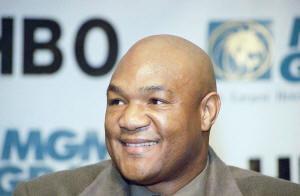George Foreman, the fearsome
heavyweight who became a beloved champion, dies at 76
[March 22, 2025]
By GREG BEACHAM
George Foreman became the heavyweight champion of the world in his
20s, only to lose his belt to Muhammad Ali in perhaps the most
memorable fight in boxing history.
A full 20 years later in 1994, the 45-year-old Foreman became the
oldest man to win the heavyweight championship, throwing one perfect
combination to steal Michael Moorer's title in an epic upset.
Few fighters ever had more big moments than Big George Foreman — and
even after he finally left the ring, he was only getting started.
The fearsome heavyweight, who lost the “Rumble in the Jungle” to Ali
before his inspiring second act as a surprising champion and a
successful businessman, died Friday night. Foreman was 76.
Foreman's family announced his death on social media, not saying how
or where he died.
“A devout preacher, a devoted husband, a loving father and a proud
grand- and great-grandfather, he lived a life marked by unwavering
faith, humility and purpose," his family wrote. “A humanitarian, an
Olympian and two-time heavyweight champion of the world, he was
deeply respected. A force for good, a man of discipline, conviction,
and a protector of his legacy, fighting tirelessly to preserve his
good name— for his family.”
A native Texan, Foreman began his boxing career as an Olympic gold
medalist who inspired fear and awe as he climbed to the peak of the
heavyweight division by stopping Joe Frazier in 1973. His formidable
aura evaporated only a year later when Ali pulled off one of the
most audacious victories in boxing history in Zaire, baiting and
taunting Foreman into losing his belt.
Foreman left the sport a few years later, but returned after a
10-year absence and a self-described religious awakening.

The middle-aged fighter then pulled off one of the most spectacular
knockouts in boxing history, flooring Moorer — 19 years his junior —
with a surgical right hand and claiming Moorer's two heavyweight
belts. Foreman's 20 years is easily the longest gap between
heavyweight title reigns.
Foreman's transformation into an inspirational figure was complete,
and he fought only four more times — finishing 76-5 with 68
knockouts — before moving onto his next career as a genial
businessman, pitchman and occasional actor.
Outside the ring, he was best known as the face of the George
Foreman Grill, which launched in the same year as his victory over
Moorer. The simple cooking machine sold more than 100 million units
and made him much wealthier than his sport ever did.
“George was a great friend to not only myself, but to my entire
family,” Top Rank president Bob Arum said. “We’ve lost a family
member and are absolutely devastated.”
In the first chapter of his boxing career, Foreman was nothing like
the smiling grandfather who hawked his grills on television to great
success.
Foreman dabbled in petty crime while growing up in Houston’s Fifth
Ward, but changed his life through boxing. He made the U.S. Olympic
team in 1968 and won gold in Mexico City as a teenager, stopping a
29-year-old opponent in a star-making performance.
Foreman rose to the pinnacle of the pro game over the next five
years, but was also perceived as an aloof, unfriendly athlete, both
through his demeanor and through the skewed racial lenses of the
time.
Jim Lampley, the veteran boxing broadcaster who worked alongside
Foreman for many years at HBO, told The Associated Press on Friday
night that Foreman's initial demeanor was an attempt by his camp to
emulate Sonny Liston, the glowering heavyweight champ of the 1960s.
“At some point somewhere along the way, he realized that wasn’t
him," Lampley said.

[to top of second column] |

Former heavyweight champion George Foreman of Houston, reacts during
a news conference in Las Vegas, Wednesday, Nov. 2, 1994.(AP
Photo/Lennox McLendon, File)

Foreman stopped Frazier in an upset in Jamaica in
January 1973 to win the belt, with his knockout inspiring Howard
Cosell’s iconic call: “Down goes Frazier! Down goes Frazier!”
Foreman defended his belt against Ken Norton before accepting the
fight with Ali in the now-immortal bout staged in Africa by promoter
Don King. Ali put on a tactical masterclass against Foreman, showing
off the “rope-a-dope” strategy that frustrated and infuriated the
champion. Foreman was eventually knocked down for the first time in
his career, and the fight was stopped in the eighth round.
Foreman told the BBC in 2014 that he took the fight almost out of
charity to Ali, who he suspected to be broke.
“I said I was going to go out there and kill him, and people said,
‘Please, don’t say you’re going to kill Muhammad,’” Foreman said.
“So I said, ‘OK, I’ll just beat him down to the ground.’ That’s how
easy I thought the fight would be.”
Exhausted and disillusioned, Foreman stopped fighting in 1977 and
largely spent the next decade preaching and working with kids in
Houston after his religious awakening. He returned to boxing in 1987
in his late 30s with a plan to defy time through frequent ring
appearances, and he racked up a lengthy series of victories before
losing to Evander Holyfield in a surprisingly competitive title
fight in 1991.
Three years later, Foreman got in the ring with Moorer in Las Vegas,
more for his celebrity than for his perceived ability to beat Moorer.
The champion appeared to win the first nine rounds rather
comfortably, with Foreman unable to land his slower punches. But
Foreman came alive in the 10th, hurting Moorer before slipping in
the short right hand that sent Moorer to the canvas in earth-shaking
fashion.
Lampley, who was calling the fight, named his upcoming autobiography
— which includes a prologue about Foreman — after his famous call of
that moment: “It Happened!”
Foreman quit the ring for good in 1997, although he occasionally
discussed a comeback. He settled into a life as a boxing analyst for
HBO and as a pitchman for the grills that grew his fame and fortune.
Much of the world soon knew Foreman as both a lovable friend and a
ferocious fighter.

“He started performing as this pitchman, this product pitchman with
the big, ever-present giant grin on his face," Lampley recalled.
"When I was working with him, people would say, ‘George is a big
clown.’ And I would say, ‘Well, you can call him a clown, but he’s
actually a genius. He may be the greatest genius I’ve ever met.’ And
people would say, ‘Well, genius, what do you mean?’ I’d say, ‘Well,
check the bank account. If that isn’t proof enough, I don’t know
what is.’ So, he was a genius. He was a human genius.”
Foreman briefly starred in a sitcom called “George” in the 1990s,
and he even appeared on the reality singing competition “The Masked
Singer” in 2022. A biographical movie based on his life was released
in 2023.
Foreman had 12 children, including five sons who are all famously
named George Edward Foreman.
“Legendary boxing champion, life-changing preacher, husband, father,
grand- and great-grandfather and the best friend you could have,”
WBC President Mauricio Sulaiman wrote on social media. “His memory
is now eternal, may Big George rest in peace.”
___
AP Sports Writer Brian Mahoney contributed to this report.
All contents © copyright 2025 Associated Press. All rights reserved |